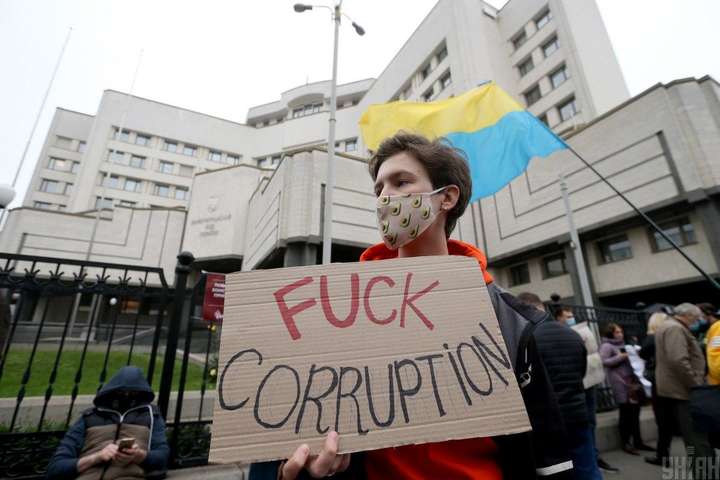The potential for backsliding was softened by the government’s decision to renew access to the online register of assets and refusal to comply with the decision of the Constitutional Court. While this move is obviously positive, formally the government cannot question the decision of the Constitutional Court as it is an independent body.
Thus Ukraine finds itself in a constitutional crisis: either the government openly violates the Constitution or Ukraine may lose western support which is tied to the anti-corruption reform.
While a final balanced solution is yet to be found, the occasion vividly illustrates the Ukrainian judiciary’s illness. Here is what is wrong with the Ukrainian Constitutional Court.
Generally, all democracies have the function of a constitutional judiciary, which checks whether the law complies with the constitution or whether government agencies follow their constitutional duties.
The function of constitutional judiciary can be distributed either among ordinary courts (notably the Supreme Court as in the USA) or be carried out by a separate judicial body, the constitutional court.
The latter is common for about 60 countries, including France, Germany, Poland and Ukraine. The legal status of the Constitutional Court is nearly the same in all European countries with only minor differences such as the appointment of judges by parliament (Germany, Poland) or mixed appointment by Parliament, President and in some cases independent judicial councils (France, Ukraine).
The history of this phenomena can be traced back to the 1990s, and there are several explanations for it.

Constitutional Court gave way to political interests
Ukraine’s modern history knows several cases when the Constitutional Court decided apparently in favor of a particular politician’s interests.
The most scandalous was the court’s decision in 2010, when it changed the constitution and expanded the newly elected president Yanukovych’s authority, cutting the power of Parliament.
The court ruled that Constitutional reform in 2004, which expanded the power of Ukrainian parliament and narrowed the responsibilities of the president, was adopted with procedural violations, and the court returned into force the Constitution of 2004.
It is important that even if procedural violations indeed took place, the court had to return constitutional amendments to the parliament for consideration of which version of the Constitution should be legal. The Court could not decide itself what the constitution’s text should be.
After the Revolution of Dignity in 2014, the 2010 decision of the Constitutional court was considered as a coup d’état in favor of Viktor Yanukovych, now formally accused of usurping power.
The popular view among civil activists was that if all the judges were imprisoned for the coup d’état, no such decisions of the Constitutional Court would be possible anymore. Yet, that was not done.
The other scandalous ruling of the court was a decision reached in February 2019. The Constitutional Court recognized the Criminal Code article that criminalizes illicit enrichment of public officials as unconstitutional.
According to the Court’s decision, the article allegedly did not comply with the presumption of innocence.
In November 2019, the parliament reinstated responsibility for illicit enrichment, softening the consequences. Yet, many officials were still able to avoid responsibility.
The latest decision by the Constitutional Court de-facto cancels anti-corruption reform, at least regarding the judiciary.
Yet the links between judges and other corrupt officials are well known and, therefore, the legitimacy of their decision is now being questioned.
1. Ukraine’s Constitutional Court is institutionally the same as in other democracies but with vague appointment procedure
It allows dishonest judges to be appointed who are then controlled by the politicians or oligarchs. Such judges make politically motivated decisions. If the judges themselves are corrupt, with illegal enrichment already proven by independent investigative journalists, then the declaration of anti-corruption reform as unconstitutional is hardly a surprise.

To change the situation, parliament should adopt an open selective competition as part of the selection process. That is the point expressed by Mykhailo Zhernakov, head of the DEJURE foundation, a leading Ukrainian NGO promoting the reform of the judiciary:
“Competitive selection [of the judges to the Constitutional Court] was already determined in the Constitution in 2016. However, it was not yet described by the relevant law to be implemented. Parliament and the president were not interested in such a law… This should be the same competitive selection as to the Supreme Anti-Corruption Court [established in 2019], where its success is already clear. Independent international experts should also be included in the commission. The key point is that anyone who wants can apply, and not as now that the candidates are nominated solely by parties and politicians, usually according to their interests…”
Now Zelenskyy proposes changing the entire composition of the Constitutional Court by the law, which is not possible legally, but does not propose appointing new judges by a new competitive procedure. Likely, he is trying to gain control over the new judges.
Explaining the possible way out of the current political crisis, Zhernakov emphasizes that the recent governmental refusal to comply with the Constitutional Court, although suspending the possible backsliding, also creates a dangerous precedent of what Francis Fukuyama calls “the political decay.”
This is a very dangerous spiral… What should be done requires a more systemic approach:
“At first we should cut the head of the Russian judicial hydra in Ukraine, that is not only the judges of the Constitutional Court but also the District Administrative Court of Kyiv that puts pressure on anti-corruption bodies, as well as the members of the Supreme Council of Justice responsible for the appointment of dishonest judges. Then, the new competitive selection procedure should be implemented and laws amended to reestablish anti-corruption reform.”
2. The culture of informal constitutionalism is weak among Ukrainians, leading to the distorted role of the Constitution and, subsequently, Constitutional Court

This more general argument is also expressed by leading Ukrainian political thinkers, in particular Volodymyr Yermolenko, Ukrainian philosopher and editor-in-chief at UkraineWorld as well as Volodymyr Rechytskyi, one of Ukraine’s leading researchers in the field of law.
The point is that simple copy-pasting of western institutions to the Ukrainian current conditions does not always succeed.
“The problem is that the European principle of ‘independent judiciary’ in our reality has led to the independence of corruption in the judiciary,” said Volodymyr Yermolenko. “Judicial reform in our country was made according to ‘European models,’ where the main goal was to strengthen the independence of the judiciary, eliminate political influences – but it was a mechanical copy of these models, and as a result the corrupt judiciary became less corrupt but more independent in its corruption… Reform of the judiciary is a path for decades. With the gradual replacement of people, practices and, most importantly, ethics. Adoption of several (dozen) laws is definitely not enough and here we face a systemic problem – it turns out that reforms require planning for decades… That’s why the country needs education, specialists, intellectuals, schools of thoughts and practices. But it’s boring. People want a show.”

Volodymyr Rechytskyi in his article elaborates more on the topic of the Ukrainian constitution and lack of the values of individual rights and individual passion in it:
“The Ukrainian founding fathers thought of the main subject of constitutional law, the ‘independent individual with his own wealth,’ no more than about Adam Smith’s ‘invisible hand.’ Instead, Stalin’s ‘iron hand’ and everything derived from it was still in the people’s genetic memory. Domestic lawmakers thought that collectivism would still be able to take into account the rights of the individual, and therefore set out economic rights as state-guaranteed social obligations in the 1996 Basic Law. It is worth noting that the fiasco of this approach has not become obvious to everyone even today. Religious tolerance was reflected in the 1996 Constitution almost at the American level…, but the institution of “public” ownership of land and natural resources has not changed since the days of communism…
Concluding with an optimistic point, one should note that the current crisis and governmental refusal to comply with the Constitutional Court is the Crossing of the Rubicon.
The crisis requires a proper сompletion of the anti-corruption and judiciary reforms and that is probably the only legal solution that remains.
Read also:
- Experts question future of Ukrainian judiciary as court cancels judicial reform
- Despite second attempt at judicial reform, political decisions rule Ukrainian courts
- Ukraine’s judicial reform stumbles with odd Constitutional Court rulings
- Corrupt and biased judges still pollute Ukraine’s judiciary; Zelenskyy’s reform will not fix this
- Legal battle: How Ukraine sues Russia in international courts

